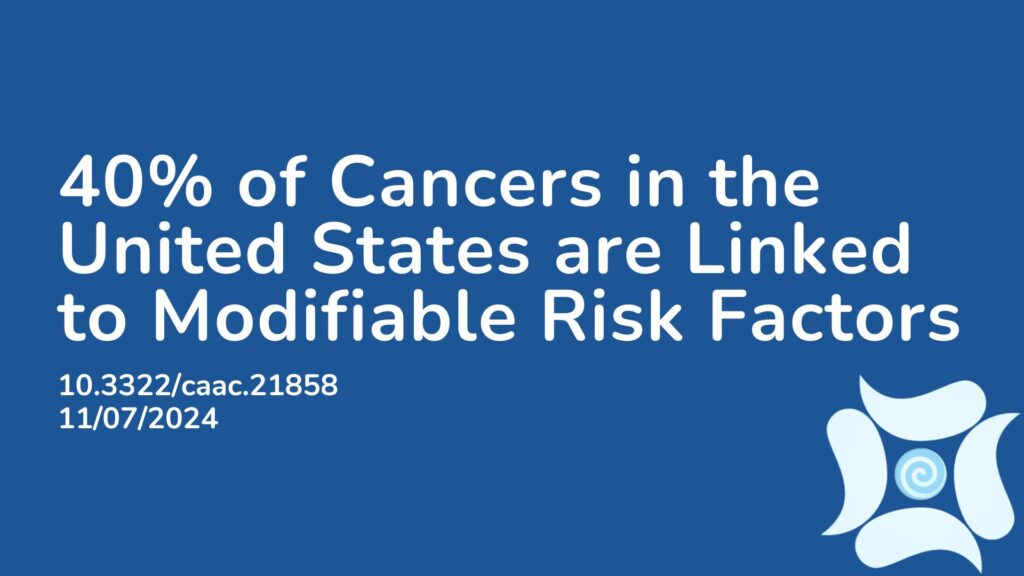Summary:
Research indicates that a large portion of cancer cases and deaths in the United States in 2014 were linked to modifiable risk factors such as smoking and diet. This study examined national data on cancer incidence, mortality, and risk factor prevalence to assess the proportion and number of cancer cases and deaths attributable to modifiable risk factors in 2019, excluding non-melanoma skin cancers. The modifiable risk factors included cigarette smoking (current and former), second-hand smoke, excess body weight, alcohol consumption, consumption of red and processed meat, low intake of fruits, vegetables, dietary fiber, dietary calcium, physical inactivity, ultraviolet radiation, and infections such as Epstein–Barr virus, Helicobacter pylori, hepatitis B and C, human herpesvirus-8, human immunodeficiency virus, and human papillomavirus. The results showed that in 2019, approximately 40% of all cancers (excluding non-melanoma skin cancers) and 44% of all cancer deaths among adults aged 30 years and older in the United States were linked to these modifiable risk factors. The primary contributor to both cancer cases and deaths overall was cigarette smoking, followed by excess body weight and alcohol consumption. More than half of the cases and deaths for 19 out of 30 evaluated cancer types were attributable to these modifiable risk factors. Lung cancer had the highest number of cases attributed to these factors, followed by female breast cancer, skin melanoma, and colorectal cancer. For deaths, colorectal cancer, liver cancer, and esophageal cancer ranked the highest. These findings highlight that a significant proportion of the cancer burden in the United States is due to potentially preventable risk factors.
Abstract:
In 2018, the authors reported estimates of the number and proportion of cancers attributable to potentially modifiable risk factors in 2014 in the United States. These data are useful for advocating for and informing cancer prevention and control. Herein, based on up-to-date relative risk and cancer occurrence data, the authors estimated the proportion and number of invasive cancer cases (excluding nonmelanoma skin cancers) and deaths, overall and for 30 cancer types among adults who were aged 30 years and older in 2019 in the United States, that were attributable to potentially modifiable risk factors. These included cigarette smoking; second-hand smoke; excess body weight; alcohol consumption; consumption of red and processed meat; low consumption of fruits and vegetables, dietary fiber, and dietary calcium; physical inactivity; ultraviolet radiation; and seven carcinogenic infections. Numbers of cancer cases and deaths were obtained from data sources with complete national coverage, risk factor prevalence estimates from nationally representative surveys, and associated relative risks of cancer from published large-scale pooled or meta-analyses. In 2019, an estimated 40.0% (713,340 of 1,781,649) of all incident cancers (excluding nonmelanoma skin cancers) and 44.0% (262,120 of 595,737) of all cancer deaths in adults aged 30 years and older in the United States were attributable to the evaluated risk factors. Cigarette smoking was the leading risk factor contributing to cancer cases and deaths overall (19.3% and 28.5%, respectively), followed by excess body weight (7.6% and 7.3%, respectively), and alcohol consumption (5.4% and 4.1%, respectively). For 19 of 30 evaluated cancer types, more than one half of the cancer cases and deaths were attributable to the potentially modifiable risk factors considered in this study. Lung cancer had the highest number of cancer cases (201,660) and deaths (122,740) attributable to evaluated risk factors, followed by female breast cancer (83,840 cases), skin melanoma (82,710), and colorectal cancer (78,440) for attributable cases and by colorectal (25,800 deaths), liver (14,720), and esophageal (13,600) cancer for attributable deaths. Large numbers of cancer cases and deaths in the United States are attributable to potentially modifiable risk factors, underscoring the potential to substantially reduce the cancer burden through broad and equitable implementation of preventive initiatives.
Article Publication Date: 11/07/2024
DOI: 10.3322/caac.21858



